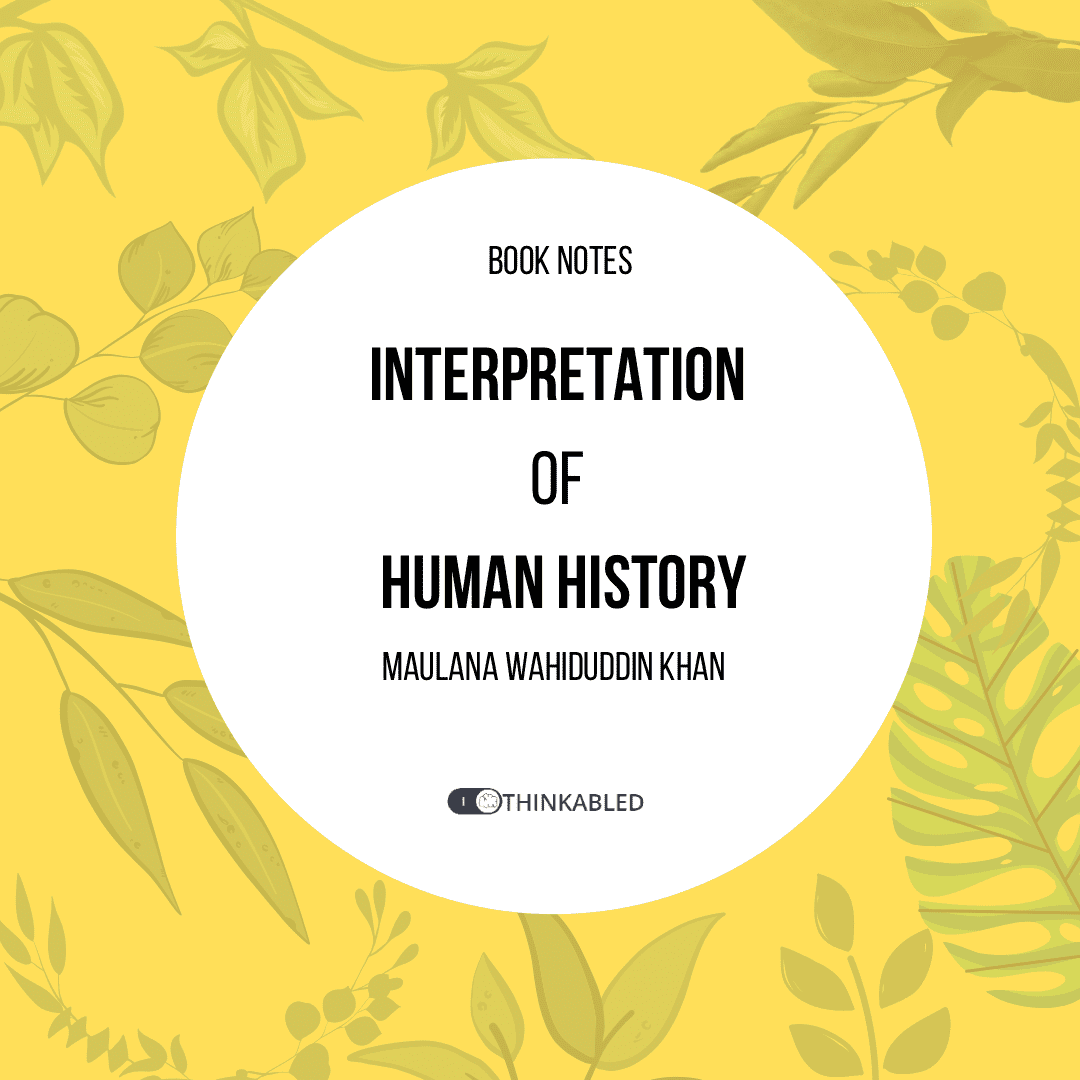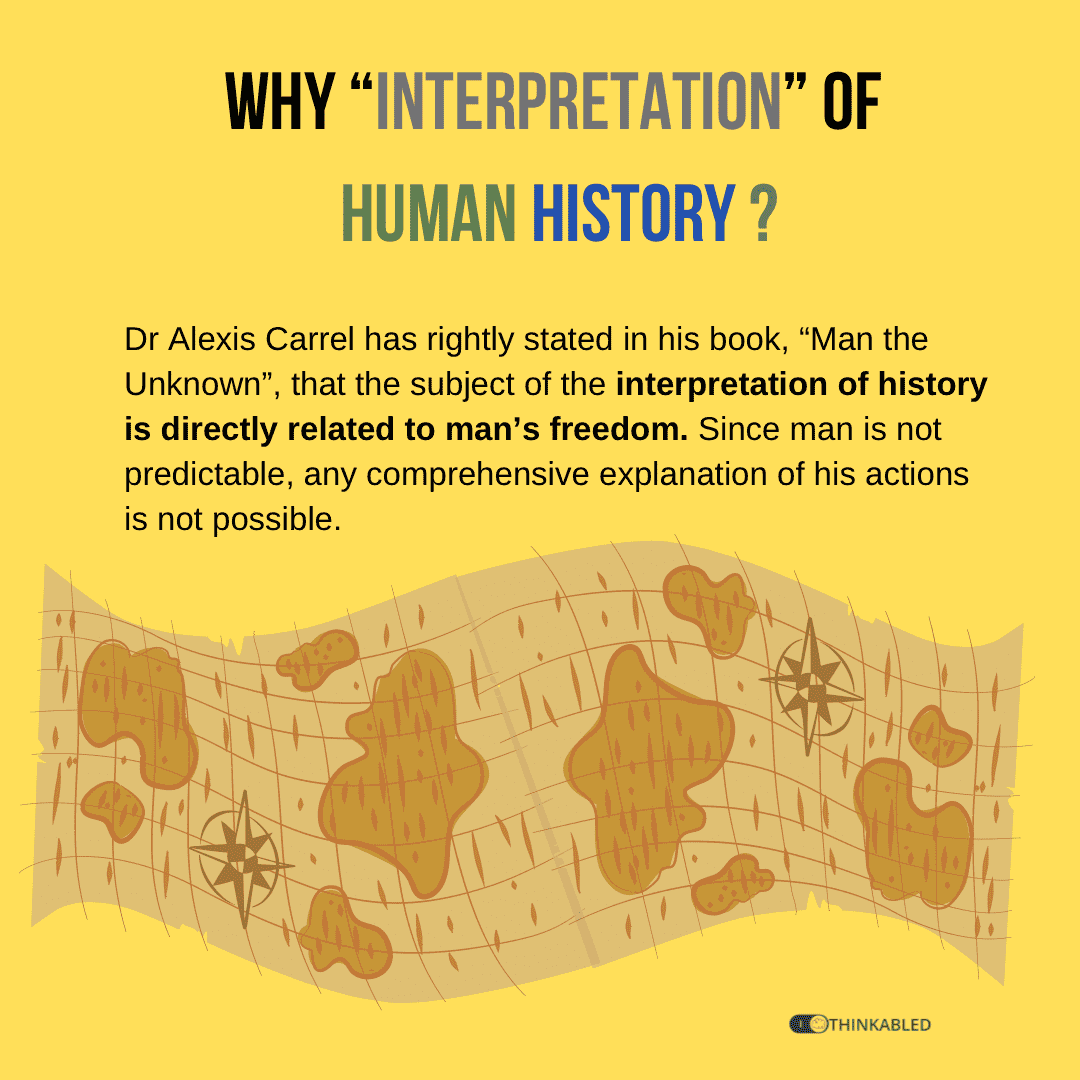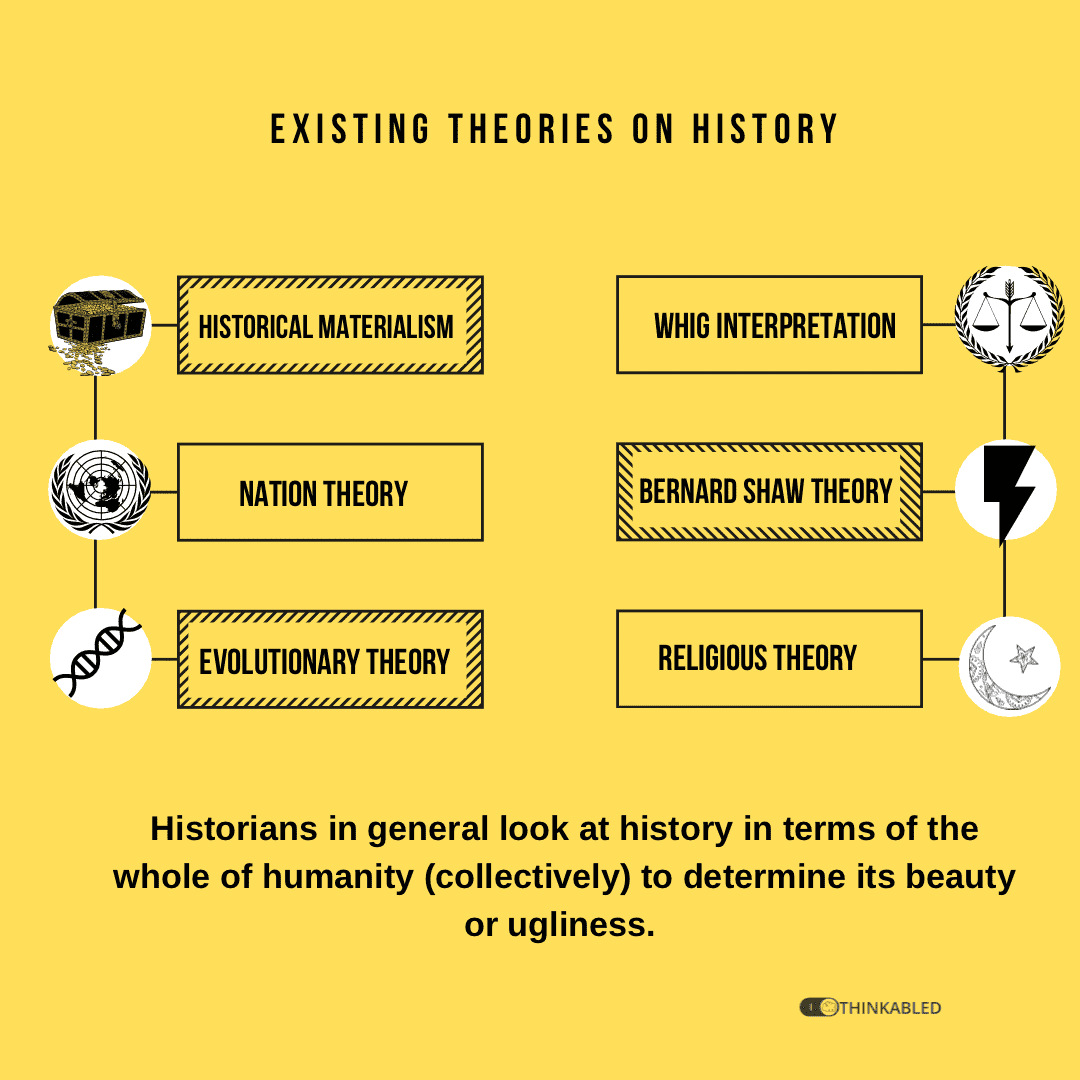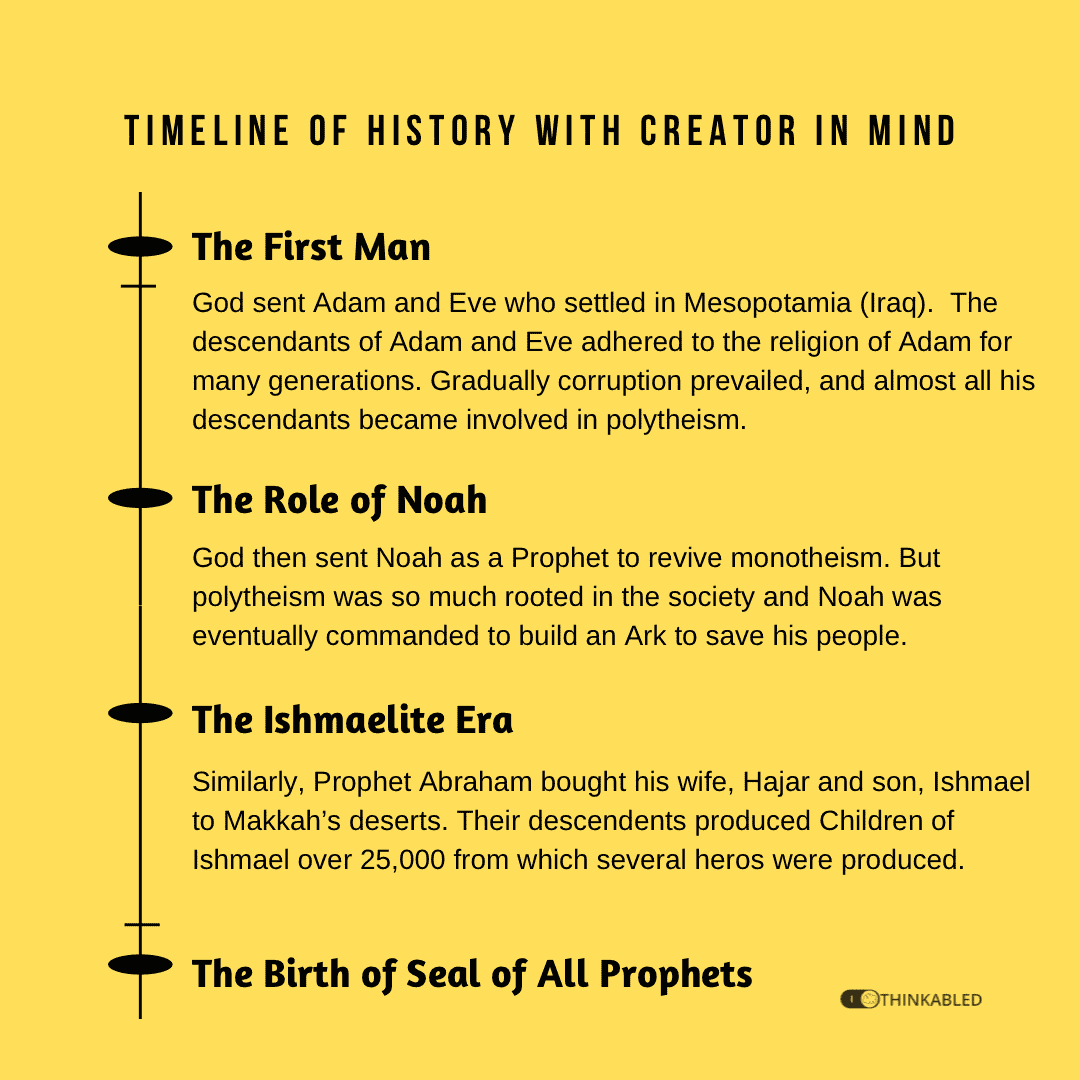Interpretation Of Human History

🚀 What is it about in 3 Sentences
- God has managed human history while fully maintaining human freedom.
- According to the creation plan, the creator did not create the present world in order to establish an ideal system at the collective level. It has actually been created for the purpose of testing human beings. That is why, God has given man complete freedom to everyone. The present world is in fact a selection ground of ideal individuals who will be found eligible to inhabit the ideal world of the Paradise in the Hereafter. Ideal individuals are being selected from every generation.
- Historians form their judgement about history in terms of the groups of human beings, whereas the right method, according to the divine concept, is to form their judgement in terms of the individuals. Human history should be interpreted taking it into account that in this temporary world, ideal individuals are being selected by God from every generation to inhabit the world of Paradise in the eternal world of the Hereafter.
💁♂️Who’s it for ?
- History-geeks
- Those who are interested in making sense of history & interpreting historical events.
- Those who wish to understand Creator’s plan for His creation.
My Top 3 Quotes
Dr Alexis Carrel has rightly stated in his book, “Man the Unknown”, that the subject of the interpretation of history is directly related to man’s freedom. Since man is not predictable, any comprehensive explanation of his actions is not possible. Every human being is at liberty to do whatever good or bad he intends. Therefore, an overall interpretation of human history is a rather difficult task.
📒 Summary + Reflections
History & it’s interpretations.
History refers to records of past events. Human history began with a man & a woman & following a continuous birth & death process, countless people have exhibited the earth. Man being inquisitive in nature, at all times has attempted to dig the past & wrote various chronicles. Hence an overwhelming amount of books have been written on history & also on the process of writing history called Historiography.
However, there is an additional subject of history which is called the ‘philosophy of history’ or the ‘interpretation of history’, for which much comprehensive literature has not been produced. The purpose of this subject is to explain the different events of human history and discover an understandable link between them. According to existing books, history appears to be a jungle of meaningless events. The English historian, Edward Gibbon (d. 1794) has aptly put it as follows:
“History, which is indeed, a little more than the register of crimes, follies and misfortunes of mankind.”
The reason for failure to offer a successful interpretation of human history is that historians are yet to discover a principle to establish a link between two contradicting requirements, which are Freedom & Determinism.
Existing Theories
Various theories have been put forward by historians & thinkers regarding this matter. What is worth noting as regards the interpretation of human history is that historians in general look at history in terms of the whole of humanity (collectively) to determine its beauty or ugliness. Also they were idealists who wanted to establish a utopian system at the level of the whole of humanity. They include from Plato & Aristotle to Mahatma Gandhi. Below are some of the prominent theories:
- Historical Materialism: By applying Newton’s laws of nature to human history, Marx gave a material interpretation of history which we may call historical materialism. According to his idea, it was not human consciousness but material conditions that shape history. But this was rejected by scholars right away.
- Nation Based: A record of various activities of a nation is considered its history, such as the history of the Indian nation, the history of the German nation and so on.
- Evolutionary Stages of History: Arnold Toynbee introduced the idea that history progresses through evolutionary stages of civilization. Therefore, the architects of civilizations are, in fact, the architects of history.
- The Whig Interpretation of History: Professor H. Butterfield gave a moral interpretation of the whole of history in the light of a universal moral code. However, the author himself admits to the fact that such an interpretation was not possible in view of the practical situation prevailing in society.
- Bernard Shaw evolutionary theory: Bernard Shaw’s interpretation is that according to the law of compulsive evolution, man has been continually travelling from the human state to superhuman state. But this theory is just an imaginary story, having no scientific standing.
- Religious History: This concept of history has not been accepted, academically, as an authentic interpretation, rather it is not even considered worthy of being referred to in modern times. For modern historians, the era of interpretation of human destiny, in the light of religion and metaphysics, is now over. This is undoubtedly baseless. It is as unscientific as saying,‘the age of God is over’, or ‘the revelation of the Prophet was just a poetic experience’, or that ‘there is no basis for religion’, that it was only a social phenomenon and so on.


Historical Interpretation with the Creator in Mind.
Most the above theories presented were based on human imagination, it doesn’t bring an light in understanding history. Author after deep contemplation, found the principle from below verse of Holy Quran.
“The straight way leads to God and there are ways which deviate from the right course. If He so wished, He would guide you all”. (16:9)
This means that God, according to His plan of creation, has been managing history while maintaining human freedom. He has given full freedom to man and is simultaneously keeping watch over the human caravan so that it may not deviate too far from the straight path. This divine principle about human history can be summed up as ‘managing history while maintaining human freedom’.
God created an ideal world which was perfect in all respects. He ordained that this ultimate world be inhabited by impeccable ideal human beings. To achieve this target, God first settled man on Earth giving him complete freedom.The present world is a selection ground for this grand project. Here, it is being observed as to who makes proper use of his freedom and who misuses it. At the end of history, those who have abused their freedom will be rejected, and those who may have exercised it judiciously will be selected and settled in heaven.
Hence according to the creation plan of God, the right method of the interpretation of history is to view the individuals rather than the humanity in totality. The creation plan of God is mentioned in the second chapter of the Quran. The translation of these verses is as follows
When your Lord said to the angels, ‘I am putting a successor on earth,’ they said, ‘Will You place someone there who will cause corruption on it and shed blood, while we glorify You with Your praise and exalt Your holiness?’ [God] answered, ‘Surely, I know that which you do not know.’ He taught Adam all the names, then He set them before the angels and said, ‘Tell Me the names of these, if what you say be true.’They said,‘Glory be to You; we have no knowledge except whatever You have taught us. You are the All Knowing, the All Wise.’ Quran (2:30-32)
In these verses God demonstrated to the angels that although a large number of human beings would become corrupt by abusing their freedom, but among such people, the righteous and law-abiding ones will also emerge. By God’s command, Adam introduced such virtuous people with principles to the angels whose minds were then put at rest.

A few pages from History.
The final testament of God: The Quran contains symbolic events about the past and predictions about the future covering the entire history of mankind until the Day of Judgement. Historians define history as a study of past events or a chronological account of past events. However, the Quranic concept of history is different from this. According to the former concept, history is a record of all the events of the past. Whereas the latter concept of history describes only the selective and representative components of history. The representative events of history are not presented in traditional historical style, but these are mentioned in the Quran only as brief references to important events. The reader is expected to do the detailing of the brief allusions to different events described in the Quran by collecting the necessary historical elements that exist outside of the Quran. This will add to his understanding of those verses. Let’s look at some key event to have a more understanding:
The Role of Noah
Adam was the first man as well as the first prophet. He and his wife Eve probably settled in present- day Iraq, called Mesopotamia in ancient languages. The descendants of Adam and Eve adhered to the religion of Adam for many generations. Gradually corruption prevailed, and almost all his descendants became involved in polytheism. They made their elders, after their death, their deities. Some of them were called Vadd, Suwa, Yagooth, Yaooq, Nasr etc. Then God sent Prophet Noah to them. He communicated the message of monotheism to these people for a long time, almost 900 years. But only a few believed in him (Quran 11:40).
Finally, Prophet Noah realised that people’s conditioning had become so rooted that every child born to them would eventually adopt the same religion of polytheism. When corruption reached that level, God decided to save the believers and destroy the corrupt. God commanded Prophet Noah to build a large ark for putting the believing men and women on board and to put a pair from every animal around him.When the Ark was ready, stormy winds started blowing at God’s behest. Torrents of water started gushing out of the ground, and there was continuous rainfall. So much so that there was water everywhere and all the people were drowned.
Ishamaletes Era
In a similar way, due to people being so harsh against monotheism, Prophet Abraham brought his wife Hajira & his son Prophet Ishmael to Makkah, a desert. In this desert environment, a new chain of procreation and reproduction began, which produced the people of Banu Ishmael or the Children of Ishmael over a 2500 year-long process of ‘desert deconditioning’. A new nation of heroes was born, termed as “a nursery of heroes” by Philip K. Hitti. It was in this group of Banu Ishmael that the Prophet Muhammad bin Abdullah was born. Prophet Muhammad strived hard for 23 years during which a great number of truth seekers from the race of Banu Ishmael joined him. They are known as the Companions of the Prophet. When Abraham told her that he had arranged her stay in the desert by God’s command, she uttered these historic words, “When it is in accordance with God’s plan, he will not let us go to waste.” (Sahih Al-Bukhari, hadith 3364) This supreme sacrifice of Hajira produced the generation known as Children of Ishmael.They were invested with noble human qualities. Professor D.S Margoliouth (d. 1940) has acknowledged this by calling this Ishmaelite race ‘a nation of heroes,’ and echoing the words of the Bible, “I will make of thee-Ishmael-a great nation.” Similarly, it was in this jungle of history that individuals like Abu Bakr and Umar Faruq were born. In spite of being invested with political power, they saved themselves from corruption. Mahatma Gandhi, describing their superior character wrote, “Though they were masters of a vast empire, yet they lived the life of paupers.” (Harijan, July 27, 1973)
These Companions of the Prophet played a key role in the accomplishment of several divine tasks. For instance, the preservation of the sacred book, the Quran, and establishing a practical model of divine religion. This divine religion which was mostly limited to the intellectual and theoretical stage during the times of the previous prophets, for the first time, reached the stage of a revolution. These significant changes made the permanent sealing and termination of prophethood possible. The era of individual prophets reached its culmination, replacing it with the era of the collective nation, the Ummah.
The Rise of Western Civilization & the Modern World
Subsequent to this event of the 7th century, the Muslims for the first time gained the political dominance which was enjoyed so far by the political systems that patronised the polytheistic culture. Under the political rule of the Muslims, a new process was set in history. It aimed to make nature the object of investigation which had only been an object of worship until then. By virtue of this revolution, man found full freedom which was essential for his intellectual development and unveiling of nature’s hidden resources.
The work of research and investigation began among the Muslims, especially during the Abbasid period. It was the heyday of Muslim empires having been established over large areas of Asia and Africa. Their energy was mostly devoted to political activities. Therefore, they could only partially engage themselves in such activities as scientific research. The work of scientific research, being a gigantic task, necessarily entailed full concentration and involvement. However, political power became an obstacle to such serious intellectual and scientific engagement.
Conversely, political power did not become an obstacle to European Christian nations in their works of scientific research which began after the Crusades. Therefore, their minds devotedly engaged themselves in the field of science. This was also a case of managing human history while maintaining human freedom.The Creator shifted the work of scientific research from the Muslim world to the Christian world when He saw that the Muslim world’s conditions were not conducive to support such pursuits.
Western civilization played a supportive role in this historical process. The status of this civilization is therefore that of a secular supporter in this historical journey. The role of science is that of a supporting element in this historical journey in the modern age. Modern science has unfolded nature and revealed the divine signs which are called ‘ayaat’ in the Quran (41:53). The contemporary age is called the age of communication. For the first time in human history modern communication has made global invitation to God possible.


Why this makes sense?
God, the Creator of man has instilled the concept of Paradise in human nature. That is why every man and woman is born with great desires and aspirations. Every human being is endowed by birth with an ideal imaginary world which has made him a paradise seeking animal. Owing to this nature, everyone is engaged in building an ideal world for himself.
Everyone devotes all his energy and resources in the pursuit of a world of happiness where he can find total fulfilment. But it is also a fact that everyone who comes to this world fails to build his desired world and finally dies in a state of utter despair. No one is an exception to this rule. I once searched the internet about the final days of about 400 eminent people. I found that each one of them had died in a state of extreme despair.
It is actually paradise, the perfect or ideal world, which is cherished by everyone. What must be remembered is that the place to find this world is the Hereafter rather than the present world. According to God’s creation plan, man must strive to earn a place in Paradise. Throughout human history, however, man has tried to build a paradise for himself in this present world. Since this goes against the divine scheme, every such effort on the part of human beings has been rendered fruitless.
The goal of some thinkers and reformers was to create an ideal world on this planet based on justice and human values. However, this never materialised as it went against God’s Creation Plan. God’s goal is to produce ideal people rather than an ideal system. These exemplary people, scattered throughout history, would be selected and settled in the ultimate world of Heaven in the Hereafter.
This approach appears to be the most convincing way of judging history. By viewing history from this angle, we can see that there have existed noble and righteous people in every generation in the jungle of the corrupted and the perverted. In this human jungle, we find such noble characters as that of Abel, Adam’s son, who said to Cain, his brother, who wanted to kill him, “If you raise your hand to kill me, I will not raise mine to kill you. I fear God, the Lord of the Universe.” (5:28)
This was a statement of peace. Thus, he set the highest example of peace-making beyond which there is no level of pacifism.
Who are the successful people?
We can learn the scheme of the Creator of the universe from a study of the Quran. In chapter 4 of the Quran there is a verse as follows, “Whoever obeys God and the Messenger will be among those He has blessed: the messengers, the truthful, the witnesses, and the righteous. What an excellent companions these are! That is God’s favour. Sufficient is God’s infinite knowledge.” (4:69-70) From this statement of the Quran, it becomes clear as to who would be the chosen people held deserving of Paradise. Four titles have been used here to describe these people. The word ‘prophet’ here refers to those who have received God’s revelations for the guidance of humanity. The word ‘siddiq’, that is the truthful, refers to those who associated themselves with the truth to the extent of enjoying a complete temperamental compatibility with prophets. The shaheed (witness) are those whose lives are so moulded with the truth that they become a witness of the truth with their whole being.The pious (saleh) refer to those whose lives are an example of a perfect coordination between their thought and action.Their actions are in full accordance with their beliefs and ideology. These are the four categories of people who will form the ideal society of Paradise. These people will not belong to any particular era or a particular society, rather, they will be selected from various imperfect societies.
Conclusion
According to the goal set by the Creator, it is not right to examine human history in terms of a just social system. It is because the Creator’s plan is to produce righteous people in this world—a testing ground— rather than an ideal system. These ideal people are the ones who would be selected to live forever in the ideal world of Paradise. A meaningful understanding of history is therefore possible only in the light of the above principle.
✍️ About the Author
Maulana Wahiduddin Khan (1925-2021) was an Islamic scholar, spiritual leader and peace activist. His work has received international recognition for his seminal contributions toward world peace. The Maulana authored over 200 books dealing with Islam’s spiritual wisdom, the Prophet’s non-violent approach, Islam’s relation with modernity and other contemporary issues.
The above information is summarised with the help of catchy infographics. Click the button below to download.
More Book Notes
Atomic Habits by James Clear
How To Take Smart Notes by Sönke Ahrens
Notes on Nationalism by George Orwell
For other book notes, click here
Get notified about our latest book notes by subscribing to ThinkAbled!
Share this:
- Click to share on Twitter (Opens in new window)
- Click to share on Facebook (Opens in new window)
- Click to share on Reddit (Opens in new window)
- Click to share on Tumblr (Opens in new window)
- Click to share on Pocket (Opens in new window)
- Click to share on LinkedIn (Opens in new window)
- Click to share on Pinterest (Opens in new window)
- Click to share on WhatsApp (Opens in new window)
- Click to email a link to a friend (Opens in new window)
- Click to share on Telegram (Opens in new window)
